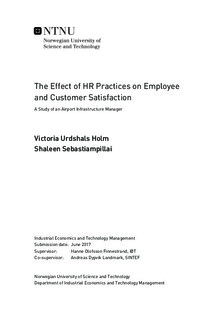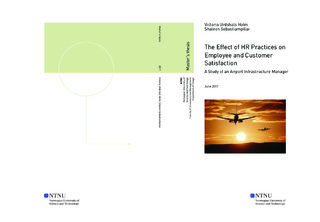| dc.description.abstract | Problem Statement: The aim of this study is to identify how the use of Human Resource (HR) practices are able to affect employee attitudes and behaviours, and how these in turn affect organizational performance measured as customer satisfaction.
Motivation: Caused by the increased competitive market, many airports have turned to service quality as a strategy for achieving competitive advantage. For service companies, the key to make profits is by satisfying their customers. As the interaction with the customers is mainly through the employees, it is crucial that they have the right skills and attitudes. Thus, the focus shifts towards how HR, and the use of High-Performance Work Systems (HPWS) can impact organizational performance. The limited research on customer satisfaction as an indicator of organizational performance, has provided an opportunity to carry out this study.
Approach: The theoretical foundation of this thesis has emerged from a literature review concerning theory on HPWS and organizational performance. The first part of the analysis is based on a qualitative approach, while the last part is quantitative. The empirical foundation is a longitudinal case study on a Norwegian airport infrastructure manager. Based on the literature, we have identified and included three HR practices and three employee attitudes and behaviours in our model. Additionally, a fourth employee variable was included as a result of the empirical data.
Results: An overall significance was found between three out of four employee variables (job satisfaction, empowerment, customer orientation) and customer satisfaction. While, organizational commitment did not have a significant connection. Further analysis on the individual airports, resulted in three groups; positive correlation, negative correlation and no correlation between employee attitudes and behaviours, and overall customer satisfaction.
Conclusion: Based on the literature and empirical findings of the case study, the HR practices are seen as important in influencing employee attitudes and behaviours, by forming the organizational climate where the employees work. The significant connection found between employee attitudes and behaviours, and customer satisfaction, implies that there are much to gain by investing in ones employees, e.g. through HR practices. However, HR practices alone are not sufficient to gain fully satisfied customers, thus the effect of external factors must be kept in mind as well. | |

